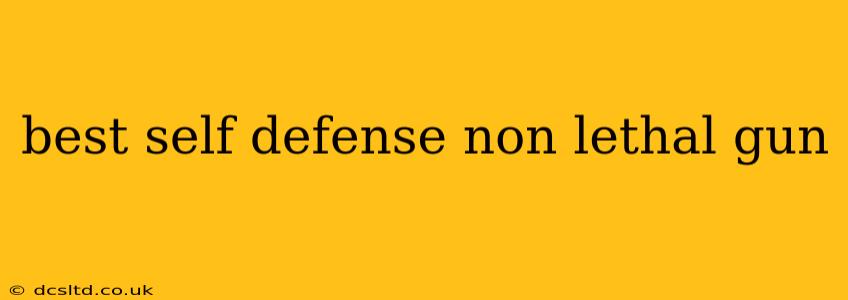Best Self-Defense Non-Lethal Guns: A Comprehensive Guide
Choosing the best non-lethal self-defense gun is a crucial decision, demanding careful consideration of your needs, local laws, and the potential consequences of using such a weapon. This guide explores various options, addressing common questions and offering insights to help you make an informed choice. Remember, while these weapons are designed to be non-lethal, there's always a risk of injury or even death depending on the circumstances and the individual's health. Always prioritize de-escalation and self-preservation before resorting to any form of self-defense.
Understanding "Non-Lethal"
It's vital to understand that the term "non-lethal" is a misnomer. While these weapons aim to incapacitate without causing death, serious injury is still possible. Factors such as the distance to the target, the health of the individual, and the specific area of impact can significantly influence the outcome.
What are the best non-lethal self defense options?
Several options qualify as non-lethal self-defense tools, each with its own set of advantages and disadvantages. These include:
-
Pepper Spray: A widely accessible and relatively inexpensive option, pepper spray causes temporary blindness, burning, and respiratory distress. Its effectiveness depends on wind conditions and the ability to accurately spray the assailant. Different formulations are available, some with added UV dye for easier identification of the attacker.
-
Stun Guns/Tasers: These devices deliver a high-voltage, low-amperage shock that temporarily incapacitates an attacker by disrupting their nervous system. Their effectiveness varies depending on factors like where the shock is administered and the attacker's clothing.
-
Air Soft Guns: While not as effective as other options, airsoft guns can startle an attacker and provide a temporary distraction, allowing you to escape. However, their limited stopping power makes them less ideal for serious threats. Furthermore, the legality of carrying an airsoft gun for self-defense varies greatly by location.
-
Personal Alarms: These small, easily carried devices emit a loud, piercing siren to attract attention and deter attackers. They are not physically forceful but act as a deterrent and a means of alerting others to a potential danger.
What is the most effective non-lethal self defense weapon?
The "most effective" non-lethal self-defense weapon depends heavily on individual circumstances and the level of threat. Pepper spray is generally considered effective at close range against a single attacker, while stun guns may be more suitable for dealing with a more aggressive or larger individual, though accuracy is vital.
Are non-lethal self-defense weapons legal everywhere?
No. Laws regarding non-lethal self-defense weapons vary significantly by location. Some jurisdictions have strict regulations regarding the purchase, possession, and use of pepper spray, stun guns, or even personal alarms. It's crucial to research and understand the specific laws in your area before purchasing or carrying any self-defense weapon.
What are the potential risks and limitations of using non-lethal self-defense weapons?
While designed to be non-lethal, these weapons carry potential risks:
- Misuse or Accidental Injury: Incorrect use can lead to injuries to the user or bystanders.
- Ineffectiveness: These weapons may not be effective against a determined or drug-influenced attacker.
- Escalation: In some situations, using a non-lethal weapon could escalate the situation, leading to more violent confrontation.
- Legal Ramifications: Even with legal possession, using a non-lethal weapon in self-defense could lead to legal consequences.
What should I consider before buying a non-lethal self-defense weapon?
Before buying, consider:
- Local Laws: Research and understand your local laws regarding the purchase and use of self-defense weapons.
- Training: Seek proper training in the safe and effective use of your chosen weapon.
- Size and Ease of Use: Choose a weapon that fits your physical capabilities and is easy to use under stress.
- Reliability and Maintenance: Ensure the weapon is reliable and understand its maintenance requirements.
Choosing the best non-lethal self-defense gun is a personal decision that requires careful research and consideration of your specific needs and situation. Prioritizing safety, understanding local laws, and acquiring proper training are essential steps in ensuring responsible self-defense. Remember, prevention and de-escalation are always the best strategies.
